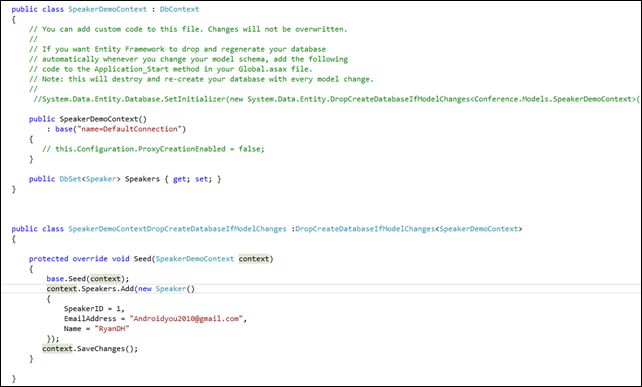You may get this very weird error when you test the API Controller using the Entity FX code-first approach. Here is my error,
| Type 'System.Data.Entity.DynamicProxies.Speaker_78C9094BC0D38F33C0C4EEAD409D4FABB88C631E3F9CDA236EF6BE10DD027500' with data contract name 'Speaker_78C9094BC0D38F33C0C4EEAD409D4FABB88C631E3F9CDA236EF6BE10DD027500:http://schemas.datacontract.org/2004/07/System.Data.Entity.DynamicProxies' is not expected. Consider using a DataContractResolver or add any types not known statically to the list of known types - for example, by using the KnownTypeAttribute attribute or by adding them to the list of known types passed to DataContractSerializer. |
and the Stacktrace,
| at System.Runtime.Serialization.XmlObjectSerializerWriteContext.SerializeAndVerifyType(DataContract dataContract, XmlWriterDelegator xmlWriter, Object obj, Boolean verifyKnownType, RuntimeTypeHandle declaredTypeHandle, Type declaredType) at System.Runtime.Serialization.XmlObjectSerializerWriteContext.SerializeWithXsiType(XmlWriterDelegator xmlWriter, Object obj, RuntimeTypeHandle objectTypeHandle, Type objectType, Int32 declaredTypeID, RuntimeTypeHandle declaredTypeHandle, Type declaredType) at System.Runtime.Serialization.XmlObjectSerializerWriteContext.InternalSerialize(XmlWriterDelegator xmlWriter, Object obj, Boolean isDeclaredType, Boolean writeXsiType, Int32 declaredTypeID, RuntimeTypeHandle declaredTypeHandle) at WriteArrayOfSpeakerToXml(XmlWriterDelegator , Object , XmlObjectSerializerWriteContext , CollectionDataContract ) at System.Runtime.Serialization.CollectionDataContract.WriteXmlValue(XmlWriterDelegator xmlWriter, Object obj, XmlObjectSerializerWriteContext context) at System.Runtime.Serialization.XmlObjectSerializerWriteContext.WriteDataContractValue(DataContract dataContract, XmlWriterDelegator xmlWriter, Object obj, RuntimeTypeHandle declaredTypeHandle) at System.Runtime.Serialization.XmlObjectSerializerWriteContext.SerializeWithoutXsiType(DataContract dataContract, XmlWriterDelegator xmlWriter, Object obj, RuntimeTypeHandle declaredTypeHandle) at System.Runtime.Serialization.DataContractSerializer.InternalWriteObjectContent(XmlWriterDelegator writer, Object graph, DataContractResolver dataContractResolver) at System.Runtime.Serialization.DataContractSerializer.InternalWriteObject(XmlWriterDelegator writer, Object graph, DataContractResolver dataContractResolver) at System.Runtime.Serialization.XmlObjectSerializer.WriteObjectHandleExceptions(XmlWriterDelegator writer, Object graph, DataContractResolver dataContractResolver) at System.Runtime.Serialization.DataContractSerializer.WriteObject(XmlWriter writer, Object graph) at System.Net.Http.Formatting.XmlMediaTypeFormatter.<>c__DisplayClass7.<WriteToStreamAsync>b__6() at System.Threading.Tasks.TaskHelpers.RunSynchronously(Action action, CancellationToken token) |
and My code,
to Fix this, just turn off the proxycreation for this DBContext







